MARP Membership Meeting: The Life of a Station Agent
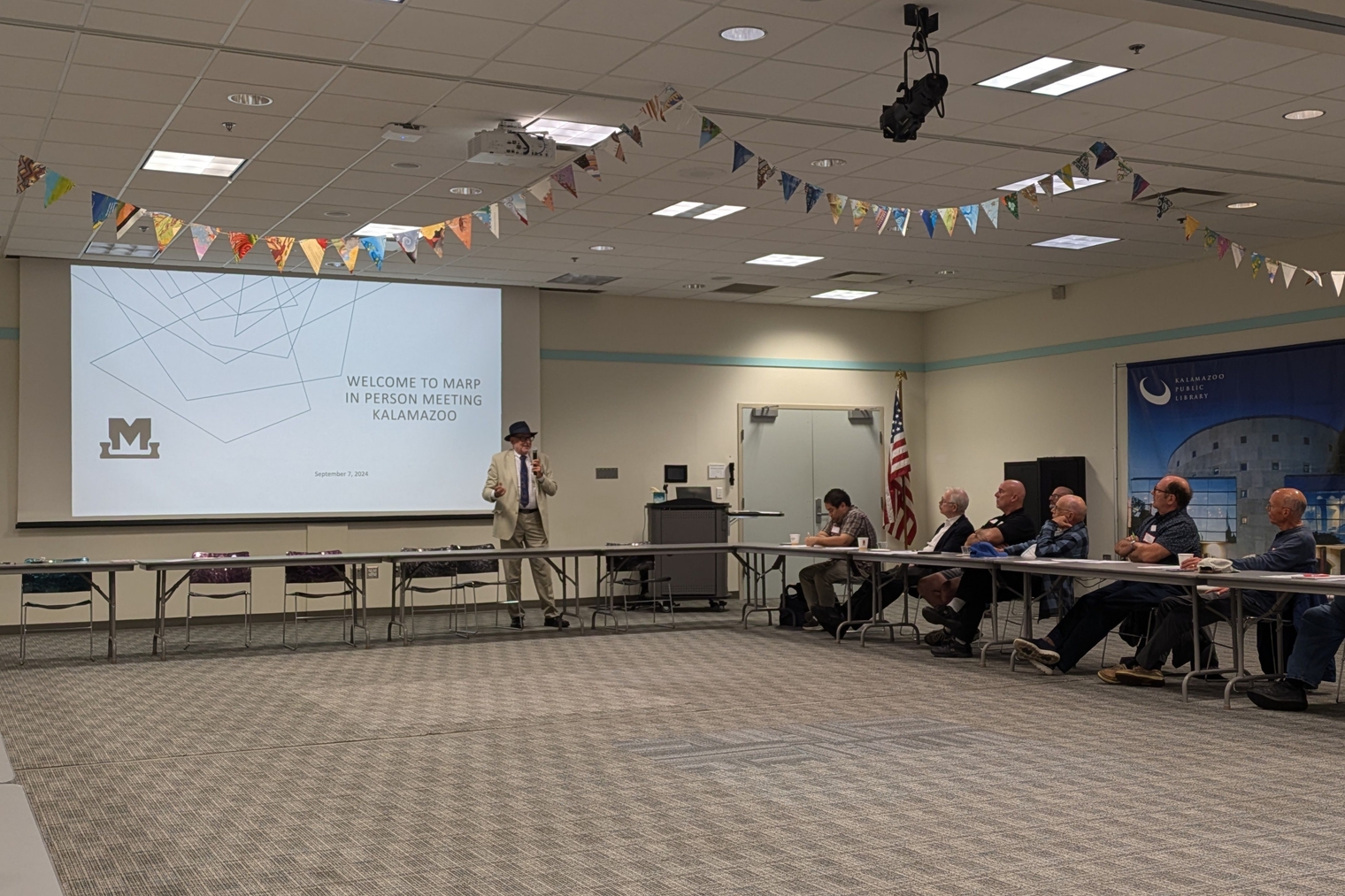
On Saturday, September 7th, the Michigan Association of Railroad Passengers (MARP) held a membership meeting inside the Kalamazoo Public Library.
Tickets, please!
Mark Buckley, retired Amtrak station agent, presented to members of MARP at this general meeting. He is well-known among Amtrak travelers and railfans, having gone on camera for interviews in May 2021 , July 2021 , and September 2021 .
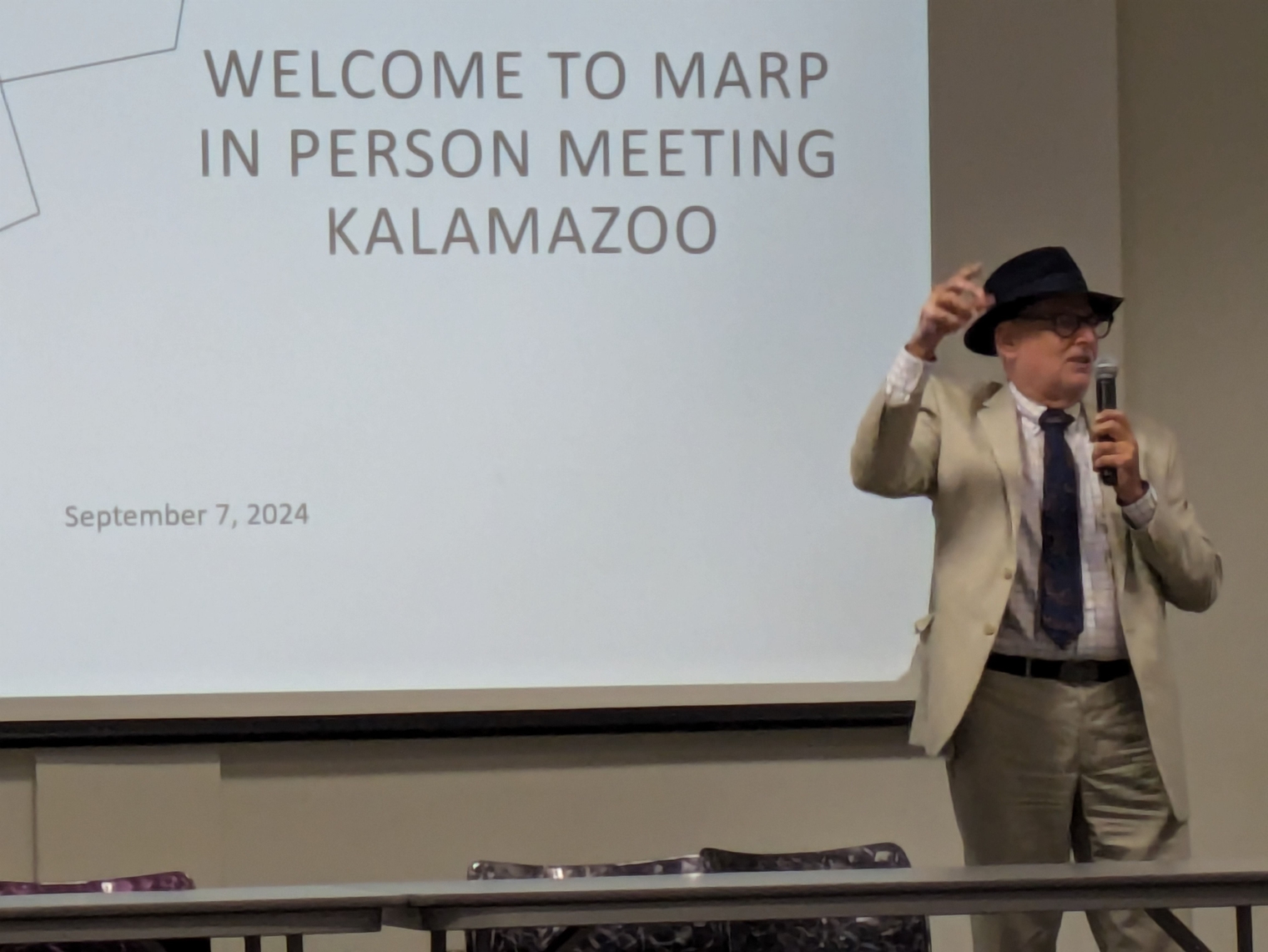
Buckley started his career in 1992 at Martin Luther King, Jr. Plaza (then Central Union Plaza) in Toledo. In the early 1990s, a proposal was drafted for the demolition of the station, but the Toledo-Lucas County Port Authority favored restoration efforts and purchased the facility from Conrail . The upper floors of the station originally housed passenger facilities, but today these floors as well as the bridge across the platform are closed to the public.
The station used to serve as an essential rail connection between Michigan and the Northeast Corridor. Today, only a Thruway connecting bus operates between Detroit and Toledo, but a Corridor ID grant was awarded in 2023 to study the restoration of Amtrak service. In years past, the Lake Shore Limited and Capitol Limited served Toledo in the afternoon, but upon expiration of Amtrak's 25-year agreement with freight operators in 1996 and the subsequent acquisition of Conrail by CSX and Norfolk Southern, Toledo became an overnight stop on both trains.
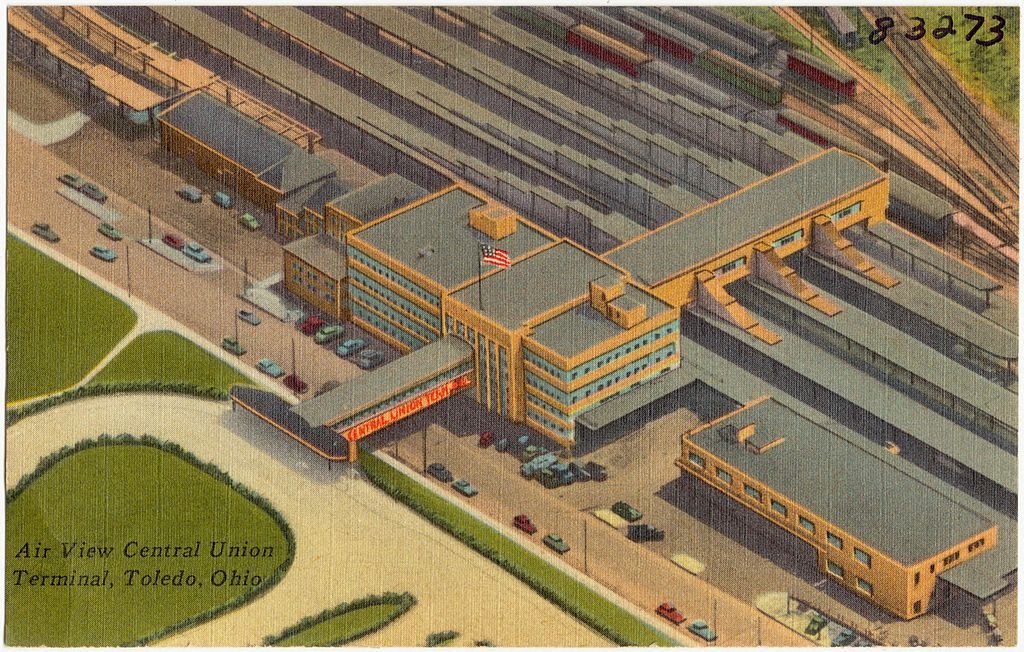
The art deco Central Union Terminal, constructed by the New York Central Railroad, entered service on September 17, 1950. (Source: The Tichnor Brothers Collection, Boston Public Library )
Station operations in 2021. The waiting room and ticketing office are now on the first floor of the building.
Modern-day travel: The loss of human interaction
Are we going to hire a station agent in Kalamazoo, or hire another bureaucrat in Lansing?
— Mark Buckley on the state of Amtrak operations in Michigan
Buckley went on to serve as a ticket agent at the East Lansing Amtrak station and ultimately the Ann Arbor station, where he worked to integrate Greyhound service with Amtrak following the demolition of the existing bus terminal. In East Lansing, with primarily college students as passengers and the advent of online ticket purchasing, he saw ridership soar while in-person sales declined, leading to Amtrak's decision to operate the new Multimodal Gateway without a station agent.
Amtrak has been increasingly managing stations from the Wilmington, Delaware Operations Center and has plans to centralize Michigan train crews as well. Wilmington can program platform announcements, handle coordination of dispatchers, and oversee other aspects of the national rail network remotely. Buckley noted this move toward offsite operations has harmed the passenger experience, particularly at stations outside the Northeast Corridor.
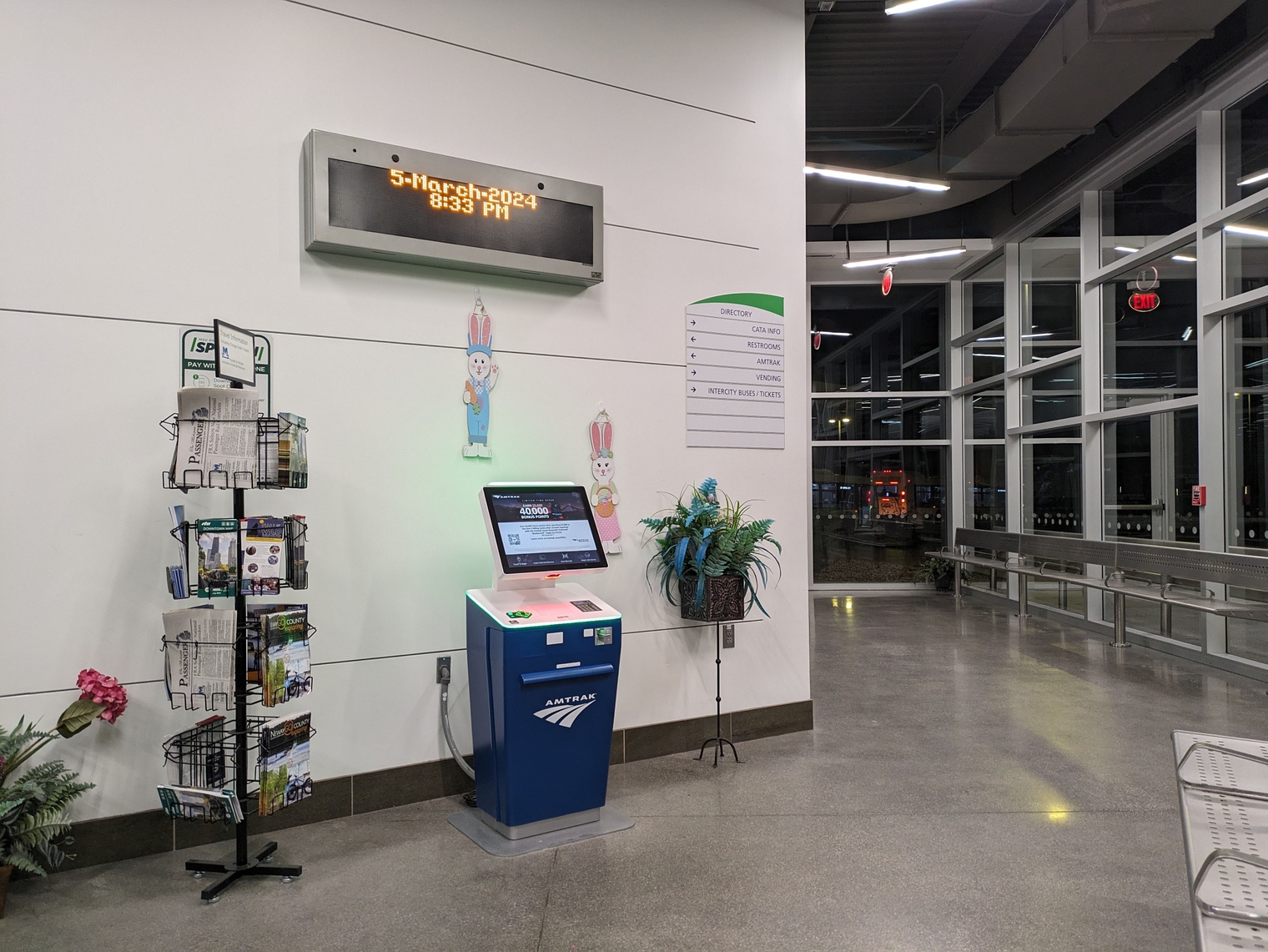
The Multimodal Gateway in East Lansing is staffed by the Capital Area Transportation Authority (CATA) for local bus information and Indian Trails connections, but only offers an automated kiosk for Amtrak ticketing. Other stations in Michigan, including Kalamazoo and Flint, have the same setup.
MARP's Station Hosts program places volunteers at the East Lansing Amtrak station for the morning Blue Water departure to Chicago, which well over 100 passengers board on a daily basis.
November 23, 2022 • 2:25 pmHappy busiest travel day of the year from the Blue Water! I'd say we have the demand to run this train more than once daily in each direction
I'm a frequent traveler on the Blue Water and have informally stepped into this role at both the East Lansing and Flint stations myself, assisting passengers with booking connecting trips on Indian Trails and other intercity carriers across the country while waiting for my train. I can tell you from personal experience that the automated ticketing kiosks do not support every edge case, particularly inter-agency connections, and are often locked behind closed waiting room doors or unavailable due to internet connectivity issues. Cash purchases are also not possible at unstaffed locations, which is critical for passengers without bank cards; unlike other rail systems like Metra and the South Shore Line, Amtrak conductors do not accept cash onboard the train.
A computerized ticketing system will never be able to replace the troubleshooting skills, local expertise, and overall accessibility a real person provides.
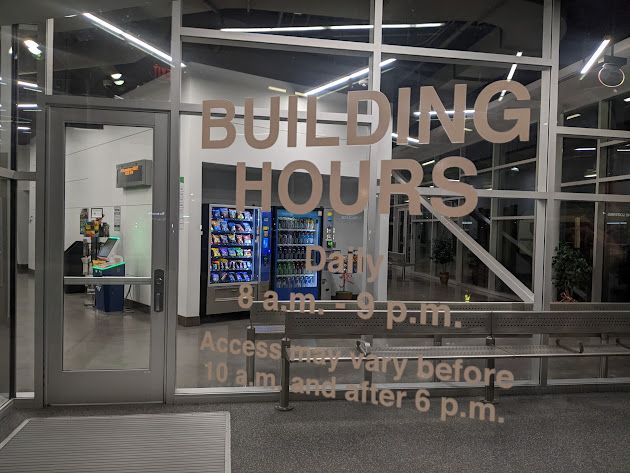
Unstaffed station waiting rooms are often locked, and if nobody from a partner agency is available with a key, Amtrak and intercity bus passengers are left out in the cold with no access to restrooms or vending, let alone a ticket machine. The Multimodal Gateway has heated vestibules which are always open, but this is the exception, not the norm.
Other Member Business
MARP leadership announced that the 2024 annual meeting will be held at the Lost Railway Museum in Grass Lake on Saturday, October 19th from 12pm to 3pm. Registration is $25 and will open in the coming weeks.
One week prior on Saturday, October 12th, the Michigan Railroad History Conference will be held in Albion. The day before on Friday, October 11th, Norm Krentel from the Illinois Railway Museum will lead a charter bus tour of historical Interurban sites between Battle Creek and Jackson. Conference registration is $70 before October 1st, $75 after. Bus tour tickets are $60. Space is limited; email the organizers for details and to register.
A previous version of this article incorrectly stated that both events would be held at the Lost Railway Museum. Apologies for the error!
Larry Krieg presented a personal photo album of the Ann Arbor level boarding platform's construction , as well as the former MichCon DTE site cleanup taking place behind the station. He also shared historical photos of Chicago's 1953 Greyhound terminal on Randolph Street across from the Thompson Center. The current Greyhound station west of the loop is at risk of imminent closure .
I incidentally captured Buckley in action at the Ann Arbor station deploying the retractable level boarding platform in February 2023. During his talk he noted that the prototype isn't without its faults, particularly in the winter months when snow buildup tends to trip the platform's safety sensors.
MDOT Office of Rail Update, September 2024
This section is copied from a handout provided to attendees with minor edits for clarity. Terms to know:
- PE/NEPA is the technical shorthand for an environmental impact study (Preliminary Engineering / National Environmental Policy Act ).
- CRISI is the Consolidated Rail Infrastructure and Safety Improvements federal grant program .
- SOGR is the State of Good Repair federal grant program for capital assistance.
- SDP is a Service Development Plan.
- CID is the Corridor ID program .
| Grant Project | Project Type | Federal Grant Source | Total Project Cost | Federal Grant | Status |
|---|---|---|---|---|---|
| Battle Creek Connection | PE/NEPA | 2019 CRISI | $1.5M | $750K | Work in progress |
| Michigan Line Bridge Reconstruction | PE/NEPA | 2021 SOGR | $2.1M | $1.5M | Pending grant agreement |
| Michigan Line Signal Infrastructure Improvements | Construction | 2019 SOGR | $13M | $6.5M | Construction began in '23 and is ongoing |
| Safety Enhancement Project | Construction | 2020 CRISI | $31M | $15.6M | Work in progress |
| Jackson Curve Modifications | Construction | 2020 SOGR | $29M | $14.4M | Construction began in '23 and is ongoing |
| Ann Arbor-Owosso Track and Brige Rehabilitation | Construction | 2021 CRISI | $42.7M | $21.3M | Pending grant agreement |
| Manistee River Bridge | Construction | 2022 CRISI | $34M | $20.4M | Pending grant agreement |
| Detroit/Pontiac Chicago SDP with Proposed Expansion to Windsor/Toronto (Step 1) | Planning | 2022 CID | $0.5M | $0.5M | Pending consultant selection |
| Port Huron-Chicago SDP (Step 1) | Planning | 2022 CID | $0.5M | $0.5M | Pending consultant selection |
| Grand Rapids-Chicago SDP (Step 1) | Planning | 2022 CID | $0.5M | $0.5M | Pending consultant selection |
- Battle Creek Connection PE/NEPA project is expected to be completed next year.
- Due to the curve modification project, the Wolverine is expected to operate with cancellation of 350 and 353 Monday-Thursday through October. 23 curves (or about 53% of the project) have been completed to date.
- FRA Corridor ID: MDOT has released a Request for Proposals to hire a consultant that will plan and develop SDPs for all three existing services in Michigan, as well as a proposed new intrastate service connecting Holland-Grand Rapids-Lansing-Ann Arbor-Detroit. The three existing services have already been selected into FRA's Corridor ID Program, and grants for Step 1 of the process have been obligated by FRA. It is expected that the plans will take at least two years to complete. When completed, they will guide investments to increase reliability and frequencies for the new services and help determine the feasibility for the proposed new service. Proposals have been received and MDOT is currently going through the scoring and selection process.
- MDOT is continuing to work with Amtrak and other stakeholders on the potential connection of the Wolverine Service with VIA Rail in Windsor.
- 3 Venture café cars have been accepted and are in revenue service and are showing up on various trains throughout the Midwest.
- Amtrak July Ridership/Revenue Update (month over month increase or decrease)
- Wolverine: 38,773 (18% decrease), $2,346,590 (1% increase)
- Blue Water: 18,173 (4% increase), $753,036 (17% increase)
- Pere Marquette: 9,509 (17% increase), $412,514 (21% increase)
I fully understand that spinning up transit service involves years of required studies and federal red tape, but we've been studying the Coast-to-Coast line for decades now. The fact we only requested Round 1 Corridor ID funds for our existing Amtrak routes when we had a proposal for a new high-ridership corridor in hand is unacceptable. If it's genuinely a case of an underfunded Office of Rail struggling to apply for available grants, the state legislature must intervene if we wish to compete with our peer states, but I believe the issue runs deeper: Once again, a culture change within MDOT is necessary. As a state, we must prioritize a mode shift away from personal vehicles rather than continue funding the unnecessary expansion and reconstruction of highways.
The FRA recently re-launched the Restoration and Enhancement Grant Program , with applications due September 30th. I sincerely hope we'll see the Grand Rapids to Detroit corridor among the submitted projects this time around.
July 12, 2024 • 4:19 pmThis is huge. You know the Borealis? Amtrak's new smash hit that's exceeded all ridership projections in its first two months? This program funded it, and now applications have reopened for the first time since FY 2019-20. $153M on the table for rail.
MARP is a membership-based 501(c)(3) advocacy association with over 200 members in good standing. Past meeting minutes are published online .
 Corey
Corey 
